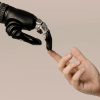If you haven’t been living under a rock, chances are you’ve heard a thing or two about the rise of AI and machines in the workforce. You’ve probably also heard phrases like “automation” and “digitization” to describe a future economy sans humans that is already well underway, especially in fields like data entry, accounting, and administrative support. If you feel nervous about whether or not you’ll have a job in this future workforce, you’re certainly not alone.
I like to focus on the more hopeful words that are floating around, such “job retraining” or “reskilling”, that imply everyday humans (like me) will still have a place in the workforce if we pivot our careers aptly. This puts emphasis on that special human-y pizazz that distinguish us from our machine competitors.
But did you know that analysts predict COVID-19 will accelerate this, giving way to a more automized work force sooner than we had anticipated?
According to The Future of Jobs Report 2020 – a report conducted by the World Economic Forum (WEF) – the number of jobs being lost right now due to the pandemic is significantly more than the number of jobs being created for a future economy (think: jobs in green energy, jobs in tech, etc.). Employers are not doing enough to account for this disparity.
Research suggests that by 2025, automation and a new division of labor between people and machines will impact 85 million jobs across 15 areas and 26 economies worldwide – and 2025 isn’t some distant future, it’s literally right around the corner.
It’s no surprise that these changes will exacerbate inequalities in the workforce, as automation disproportionally affects low-skilled workers, young people, and women.
Managing Director of the WEF Saadia Zahidi had this to say: “…accelerating automation and the fallout from the COVID-19 recession has deepened existing inequalities across labor markets and reversed employment improvements gained after the global financial crisis.”
Of all the negative fallout from the COVID-19 pandemic, a widened wealth gap is one that will persist even after the vaccine is distributed. The marginalized and disenfranchised do not always have the privilege of flexibility when it comes to career pivoting and reeducating, which I firmly believe will come back to bite employers in the bum later on.
Even if you have kept your job during this time, research shows that about 50% of you will need to reskill ASAP. So if you’re not a wealthy, educated business owner who is typically unaffected by mass struggle, chances are you’re going to have to take immediate actions to insure that come 2025 (or sooner!) you still have a way of providing for yourself and your family.
My advice? If you’re unemployed (or tied to your employer by a thread), now is the time to take matters into your own hands and reskill. Take a class on HubSpot. Complete a UX course. Develop the parts of yourself that make you human (Hint: Try spending your free time engaging with others and not scrolling on Instagram or Twitter).
Essentially, we have to learn to future-proof our jobs because no one else is going to do it for us. The only silver lining to this the period of uncertainty is the free time – so take advantage of it and become your machine competitor’s worst nightmare.
Anaïs DerSimonian is a writer, filmmaker, and educator interested in media, culture and the arts. She is Clark University Alumni with a degree in Culture Studies and Screen Studies. She has produced various documentary and narrative projects, including a profile on an NGO in Yerevan, Armenia that provides micro-loans to cottage industries and entrepreneurs based in rural regions to help create jobs, self-sufficiency, and to stimulate the post-Soviet economy. She is currently based in Boston. Besides filmmaking, Anaïs enjoys reading good fiction and watching sketch and stand-up comedy.











































Ann Cummings
November 5, 2020 at 8:44 am
As more time went on, I began realizing just how quickly this automation was accelerating all around us. The places we went into all had plenty of self-checkout stations, little stations for self-help around a store if you couldn’t find something or needed a price, food stations, etc. And the longer this virus has gone on, the more automation has taken over so many jobs. And it definitely will continue to march on. All done in the name of safety and precautions due to the virus, but look at the difference 8-9 months has already made…..
Pingback: Flying cars preparing for takeoff – in Florida? - The American Genius
Pingback: Applying for a home? Robots and automation may decide your fate
Pingback: The top 10 languages you can know as a programmer
Pingback: Small businesses, upgrade your social media presence with Luma
Pingback: Upgrade your spreadsheets and integrations with this intuitive tool